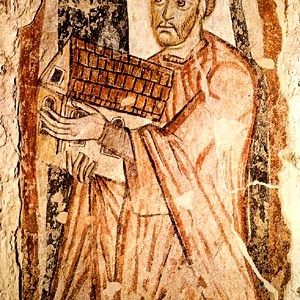The Facts of Life Series: The Great Commission
“The eleven disciples went to Galilee to the mountain to which Jesus had ordered them. When they saw Him they worshipped, but they doubted. Then Jesus approached and said to them, “All power in heaven and on earth has been given to me. Go, therefore, and make disciples of all nations, baptizing them in the name of the Father, and of the Son, and of the holy Spirit, teaching them to observe all that I have commanded you. And behold, I am with you always, until the end of the age”
(Matthew 28:16-20)
This is the essence, the sum and substance of our Catholic calling, our divinely ordained mission. The direct mission from the very mind and mouth of Jesus to the first eleven apostles and to every disciple since that moment. This is Jesus’ Great Commission. This is the enduring mission of the Church and all its converts and constituents from its very beginning and down through the centuries to our present age and our modern moment.
And it remains our primary and encompassing purpose. Despite the passage of time. Despite our many modern advances and comforts. Despite our modern tendency to make the substance of our faith merely one choice among many other equal options. Despite our modern inclination to make the truth of our faith a private matter, a matter of personal perception and preference, rather a matter of actual and factual truth.
Make disciples of all nations. Teach them to follow all that Jesus commanded. This is all very direct and very simple, very clear and very comprehensive. And it requires willful disregard or passive avoidance to escape our duty for such core responsibilities and such crucial realities.
The Great Commission is the primary purpose of Jesus’ disciples from the beginning of the Church. This is our overriding mission and our implicit motive infused in all we do in church, in our homes and at work, in our communities and our culture, in our politics and in our nations.
It is also a perpetual practical process for each and every Catholic. It is a personal developmental process, a process of transformation and maturation, a lifelong quest fueled by a mindful and willful pursuit of truth and virtue arising from the reality and content of our faith and reliant on our everyday epiphanic intimacy with God, who is with us “even to the end of the age.”
For true discipleship is a state of mind, a matter of our heart, just as it is the reason for our actions, attitudes and aspirations. It is our all-encompassing temporal and eternal purpose, the sum and substance of our motives, the verities and visibility of our character and personalities. For pursuing true discipleship excludes no facet or feature of our being. At least when we get it right.
And, it is truly right when we know and more perfectly embody the truth, the fullness of our faith’s truth without exception or error. For without its reason and its righteousness, without its love, sacrifice and suffering, we can never be more than a shadow of the true discipleship Jesus expects of us.
But, this call to discipleship is more than a call to our personal discipleship. It is a personal call, just as much as it is a missionary and an evangelistic calling. It is an internal aspiration and an external duty. It is something we are, and it enlivens everything we do. It is our aspiration and inspiration, just as it is manifest in our motivations, our interactions, our actions.
In our times, as in all times since Jesus first told His apostles, it is our duty, our calling, our purpose, our mystical and practical mission. It is our personal goal and our social, cultural and political mission to the lost and confused, the forlorn and faithless, to the avaricious and the ambitious, to the poor, the weak, the sinful. For the call of discipleship, when properly embraced, leaves no facet or feature of our individual and collective lives out.
Yet, in our modern times, we mitigate the clear directive to discipleship by bending it in ways that our forebears and martyrs down through the centuries would not recognize. We sanitize our faith’s certainties and its demands to suit the excesses and omissions of our modern proclivities and sensitivities or our personal preferences and personalities.
Just think of our modern dictums of relativism and tolerance and their implicit imperatives to avoid confrontation and judgement and to prefer conformity with these imperatives and their emphases on acceptance and even approval. Yet, making disciples means making people uncomfortable because the Gospel is inherently challenging, particularly in our modern world.
And that is what we are called to do. Asserting that God exists, that Jesus is truly the God Incarnate, that there is actual metaphysical and moral truth, that reason and science can prove such truths, that God has communicated with us directly as revelatory truth demonstrates are, by their very nature, arresting, confrontational, judgmental.
This is why our Catholic apostles and saints were slain for their faith down through the centuries. This is why ordinary Catholics, across time and geography, have suffered physically and emotionally, socially, economically and even fatally at the hands of those who rejected the Gospel message and those who feared the Faith.
The Great Commission is our duty and the Gospel is our message. But it is a message of comfort and of confrontation. A message of hope and love, but also a message of conviction and judgement. A moral message and a message of truth. And, this why it is an unsettling and confrontational message, particularly in our modern times. For most moderns have a low tolerance for assertions of truth of any kind, particularly those of a religious or moral nature.
Yet, this is precisely why it is our mission, our duty, our loving obligation. For we are to be the “light” of the world bringing the clear light of the truth to a lost and fallen world. And, this is why we are to be its “salt,” as well. For we are to be the world’s preservative agency that reduces the effects of human sin and error, immorality and perversity, greed and envy, anger and pride, as well as lusts for power and prominence.
As Jesus’ disciples, we are to be ever more clear reflections of the beauty and goodness, the love and the truth of God’s very nature. Think of St. Francis’ adage, that we should “Preach the Gospel at all times and when necessary use words.” There is sound truth here. For we should be ever more clear reflections of God’s nature. But, it is incomplete advice for our modern moment.
For St. Francis spoke this to the Catholic world of his time, to Christendom. And, he assumed people would infer this Gospel message from the manifest character of Catholics, in general. This was a fair assumption for its time. But now, it is an erroneous message, particularly in light of the active imperatives of Jesus’ Great Commission to “make disciples” and to “baptize them” and to “teach” them. These are all more explicit and actively evangelistic and maturational duties and missions.
Also, in our modern moment being a role model, as St. Francis suggests, leaves it up to the individual observing a Catholic to link their observations about Catholics to the nature and truth of the Gospel message. And, it simultaneously assumes this observer is seeing things correctly and interpreting them accurately, in light of the truth and morality of the Catholic faith. And, those are two groundless assumptions to make, particularly in light of the gravity of evangelization and our modern secular proclivities to assume some form of tacit agreement with the dominant ideas of tolerance and relativism.
As Catholics, we are each responsible to do what we can to evangelize the people we encounter. And, given the call “to make disciples,” we are also called to be ever developing our personal discipleship and intimate relationship with God, just as we should assist and encourage our families and fellow Catholics to reach greater heights and depths of discipleship.
In keeping with the link between our personal growth as disciples and our ability to teach and encourage others and to evangelize the lost, we need to ever expand our knowledge and ability in areas that may not come easily or naturally, beyond our personal devotional disciplines and interests.
One crucial area to evangelism and to mature discipleship is the field of apologetics—the explanation, justification and defense of our Faith. St. Peter reminds us to “Always be ready to give an explanation to anyone who asks you for a reason for your hope.” For our hope arises from truth and fact. We believe and hope because our Faith is true, provably true.
Explaining, justifying and defending the Faith rests on reason, which reflects the mind of God, as well as on God’s revelation to us directly. Most early stages of modern evangelism rest on the clear presentation of reason’s power and its ability to prove, along with science, the existence and nature of God. Such rational justification is crucial knowledge nowadays, as so much of our cultural, social and even political issues arise from mere belief and from irrational ideas that lack any rational justification.
While the need to make disciples of all nations has been the Church’s primary imperative from its inception, our modern moment may be a more severe challenge than the pagan world of the early church. For in our world’s dominant culture now, reason and religion are particularly reviled and rejected. So, if we are to be effective in our pursuit of the Great Commission in our modern moment, we must understand the flaws and fallacies upon which modern culture and philosophy rests.
We must be willing to spend our time and expend our energy to understand these fallacious flaws and to explain and to lead the lost to the truth of our faith and to a relationship with God. For such a concerted personal commitment will only enhance our understanding, improve our character, expand our evangelistic effectiveness. And, it will widen our witness in the world in ways that will inspire the faithful, encourage the complacent, convince the curious, engage the reluctant and challenge the hostile.
For Jesus told us that “All power in heaven and on earth has been given to me.” And He is “with you always, until the end of the age.” For we do not labor to execute the Great Commission in our own strength alone. And, we labor not in isolation. For He is ever with us.
✠
This article is the sixteenth part in an extended series on the “The Facts of Life” by F. X. Cronin. You can start with part one by clicking here and see previous entries by clicking here.
We also recommend Mr. Cronin’s latest book, The World According to God: The Whole Truth About Life and Living. It is available from your favorite bookstore and through Sophia Institute Press.













